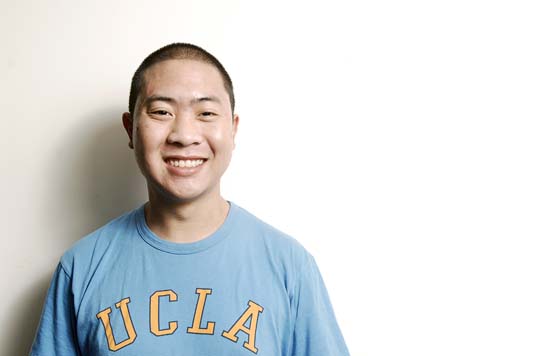Last quarter, Chris Ah San met with the democratic caucus chair for the California State Assembly to discuss legislation affecting students.
“He grilled the heck out of me,” Chris Ah San, a fourth-year economics and music performance student said. “But you could see that he had genuine interest in helping students. It was a really empowering experience.”
Ah San, along with several other students, spoke with John Pérez last quarter to push for legislation that would increase taxes on millionaires, which they felt would help prevent tuition hikes. The discussion was organized by Bruin Lobby Corps, a group that Ah San co-directs.
Bruin Lobby Corps is the legislative advocacy wing of the office of the external vice president, and is responsible for building relationships between students and officials from various levels of government, Ah San said.
The group holds about one lobby visit per week, said second-year political science student Erienne Overli, a director of scheduling for Bruin Lobby Corps.
Some are at the local level, such as lobbying members of the Los Angeles Board of Education, while others are at the state or federal level, such as a recent lobby visit that sent students to Sacramento to lobby a state superintendent, Overli added.
Overli said that lobby visits consist of no more than five students per trip, and that the group tries to send one experienced student per visit and give the rest of the openings to new members.
“We want to give everyone an opportunity,” she said.
The group has been working on lobbying programs for numerous issues and legislators this year, in a time when fee increases have so drastically impacted student life, Ah San said.
Current projects include lobbying U.S. Senator Dianne Feinstein, the Los Angeles County Board of Supervisors, the Los Angeles Board of Education and numerous other state legislators.
Issues of concern for these lobby visits include the endorsement of the Student Aid and Fiscal Responsibility Act and the DREAM Act, both of which aim to make college more accessible and affordable for students, Overli said.
A third issue of importance to the group, she added, is the revocation of the two-thirds rule, which mandates that all California legislation on revenue and budget must be approved by a two-thirds majority.
“All the issues we have had for higher education can be linked to the two-thirds vote,” she said.
The group also completed a number of projects during fall quarter, including lobbying State Assembly Speaker Karen Bass and State Superintendent of Public Instruction Jack O’Connell in order to convince them to attend the last UC Board of Regents meeting.
Ultimately, Karen Bass did choose to attend the meeting, Ah San said.
“The speaker of the assembly doesn’t usually come to the meeting, but she did this year,” he said.
One of the group’s current goals is to increase the number of students who learn about and participate in lobbying opportunities, Ah San said.
Bruin Lobby Corps is open to all students, and anyone interested in learning to lobby can receive training and attend group-organized lobby visits, he added.
“We have been working on making it more transparent this year, we want students to know what we are working on and we want students to be able to tell us what they think we should be working on,” he said.
In order to achieve this, Bruin Lobby Corps has held multiple training workshops in conjunction with student groups such as Bruin Democrats, and also held a workshop on the Hill before the November UC Regents meeting, Ah San said.
The group has also been working toward increased accessibility by conducting outreach efforts such as flyering across campus, said third-year political science student Justin Reyes, a research director for the organization.
“Students can gain a lot from speaking to a legislator. Many of them really love the lobby experience and being able to make a difference,” Reyes said of these efforts.
Overli herself has not yet been able to attend a lobby visit because of all the work involved in scheduling.
“I think the hardest part is getting legislative officers to respond to me,” Overli said. “I called the office five times and sent seven e-mails to get the Karen Bass meeting.”
However, Overli said she would participate in her first trip sometime this quarter.
“I’m really excited about it,” she said. “It’s the most direct way to get things done.”
